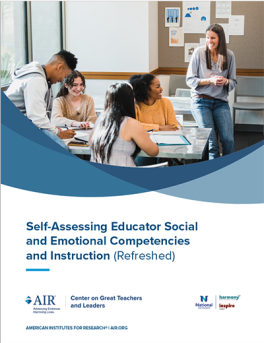Self-Assessing Social and Emotional Instruction and Competencies: A Tool for Teachers

The educational community is increasingly focused on the development of students’ social and emotional learning (SEL) competencies and the link between SEL and improved educational attainment and achievement. SEL is the process through which students develop the skills necessary to recognize and manage emotions, build relationships, solve interpersonal problems, and make effective and ethical decisions.
The significance of SEL continues to grow in the context of policy debates concerning school improvement and individual student achievement. As a result, educators must understand how best to implement the most effective strategies to promote students’ development of SEL competencies. They must understand, too, how to build and improve their own SEL competencies, because teachers’ social and emotional competencies directly affect how they interact with students on both social and instructional levels.
This self-assessment tool is designed to help educators reflect upon (1) their current teaching practices that impact student SEL, and (2) their own SEL competencies to implement those teaching practices. Essentially, the aims of this tool are as follows:
- To enable teachers to reflect and self-assess on SEL as an integral part of high-quality teaching and learning
- To provide a broad measure of the teacher’s ability to promote student SEL through instructional practices
- To provide a mechanism for teachers to reflect on their own SEL competencies and to consider what impact their capabilities have on the implementation of practices that support SEL
- To provide teachers with self-reflective feedback that can be used as part of their professional development plans or educator evaluations
In the tool, teachers can self-assess on 10 teaching practices that support social and emotional learning for students, which we identified in our recent brief, Instructional Practices That Integrate Equity-Centered Social, Emotional, and Academic Learning.
